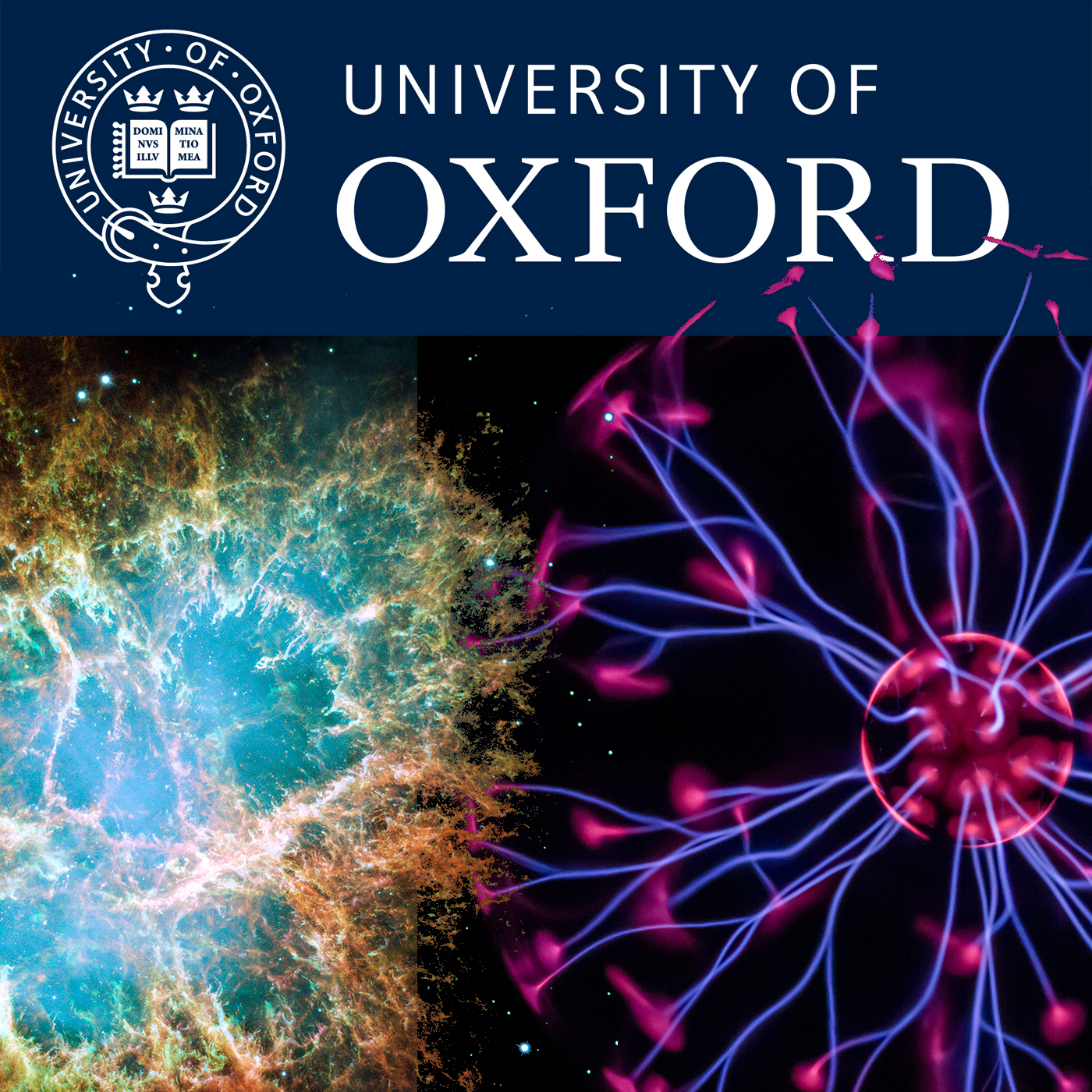

Theoretical Physics - From Outer Space to Plasma
Oxford University
Learn about quantum mechanics, black holes, dark matter, plasma, particle accelerators, the Large Hadron Collider and other key Theoretical Physics topics. The Rudolf Peierls Centre for Theoretical Physics holds morning sessions consisting of three talks, pitched to explain an area of our research to an audience familiar with physics at about second-year undergraduate level.
Episodes
Mentioned books

May 24, 2016 • 44min
String Theory: Then and Now
Members of the Rudolf Peierls Centre for Theoretical Physics hosted the ninth Saturday Morning of Theoretical Physics on 21st May 2016. Talk 1 by Professor Joseph Conlon.

Feb 11, 2016 • 39min
How computers have changed the way we do physics - Breaking through the quantum barrier
The power of available computers has now grown exponentially for many decades. The ability to discover numerically the implications of equations and models has opened our eyes to previously hidden aspects of physics. Many exciting phenomena observed in condensed matter systems, such as superconductivity and the quantum Hall effect, emerge due to the quantum mechanical interplay of many electrons. The laws of quantum physics are governed by the Schrödinger equation, whose complexity grows exponentially with the number of particles it describes. Hence, even an approximate numerical solution of the Schrödinger equation is impossible for only just a few particles, not to mention for the millions of particles that are present in real materials. This talk focuses on a new approximation scheme in terms of so-called Tensor Network States, which allow for an arbitrarily accurate description of realistic quantum solid state systems at merely a polynomial overhead in the particle number, thus enabling efficient simulations of such systems on today's computers.

Feb 11, 2016 • 37min
How computers have changed the way we do physics - Structure in complex systems
The power of available computers has now grown exponentially for many decades. The ability to discover numerically the implications of equations and models has opened our eyes to previously hidden aspects of physics. In physics, "complex systems" are systems of many similar interacting parts, such as the interacting atoms that make up a solid or liquid, but also interacting organisms in an ecosystem, or interacting traders in the stock market. This lecture will discuss how recent advances in modeling and computer simulation have allowed us to apply physics-style approaches to these previously challenging real-world systems to learn about such things as the spread of diseases, the flow of traffic or the structure of entire human societies.

Feb 11, 2016 • 52min
How computers have changed the way we do physics - Chaos and climate change
The power of available computers has now grown exponentially for many decades. The ability to discover numerically the implications of equations and models has opened our eyes to previously hidden aspects of physics. In this lecture, Myles Allen addressed how computers have transformed our understanding of the role of chaos and exponential error growth in weather forecasting; and our understanding of how climate change is impacting regional weather. He showed how research in Oxford Physics, made possible by high-end computing, is demonstrating the crucial role of eddies in controlling ocean climate; and how the probability of extreme weather events may respond to rising greenhouse gas concentrations. He concluded by throwing out a more controversial suggestion that super-computers haven’t really contributed very much to the problem of predicting century-timescale changes in global average temperature, however much they may have contributed to understanding the regional implications of large-scale warming.

Sep 24, 2015 • 47min
Gravitational lensing: one of the sharpest tools in an astronomer's toolbox
Members of the Rudolf Peierls Centre for Theoretical Physics hosted the eighth Saturday Morning of Theoretical Physics on 19 September 2015. Talk 3 by Professor James Binney.

Sep 24, 2015 • 45min
General Relativity: what is it & why Einstein conceived it thus
Members of the Rudolf Peierls Centre for Theoretical Physics hosted the eighth Saturday Morning of Theoretical Physics on 19 September 2015. Talk 2 by Professor John Wheater.

Sep 24, 2015 • 41min
Cosmology from General Relativity
Members of the Rudolf Peierls Centre for Theoretical Physics hosted the eighth Saturday Morning of Theoretical Physics on 19 September 2015. Talk 3 by Pedro Ferreira.

May 21, 2015 • 48min
Making the Vacuum Concrete
Members of the Rudolf Peierls Centre for Theoretical Physics hosted the first Saturday Morning of Theoretical Physics on 22 June 2013. The event focussed on how we use field theory to understand material reality.

May 14, 2015 • 39min
Basics of Anyons and Nonabelian Aharanov-Bohm Effect
Members of the Rudolf Peierls Centre for Theoretical Physics hosted the 7th morning of Theoretical Physics covering the idea of quantum computation and the strange behaviour of certain types of fundamental particle.

May 14, 2015 • 34min
Knots, World-lines, and Topological Quantum Computation
Members of the Rudolf Peierls Centre for Theoretical Physics hosted the 7th morning of Theoretical Physics covering the idea of quantum computation and the strange behaviour of certain types of fundamental particle.


